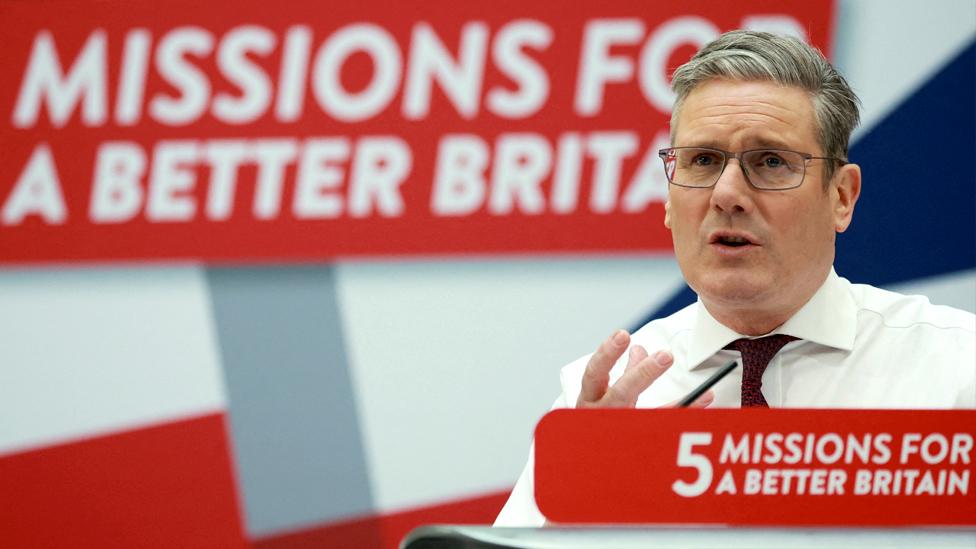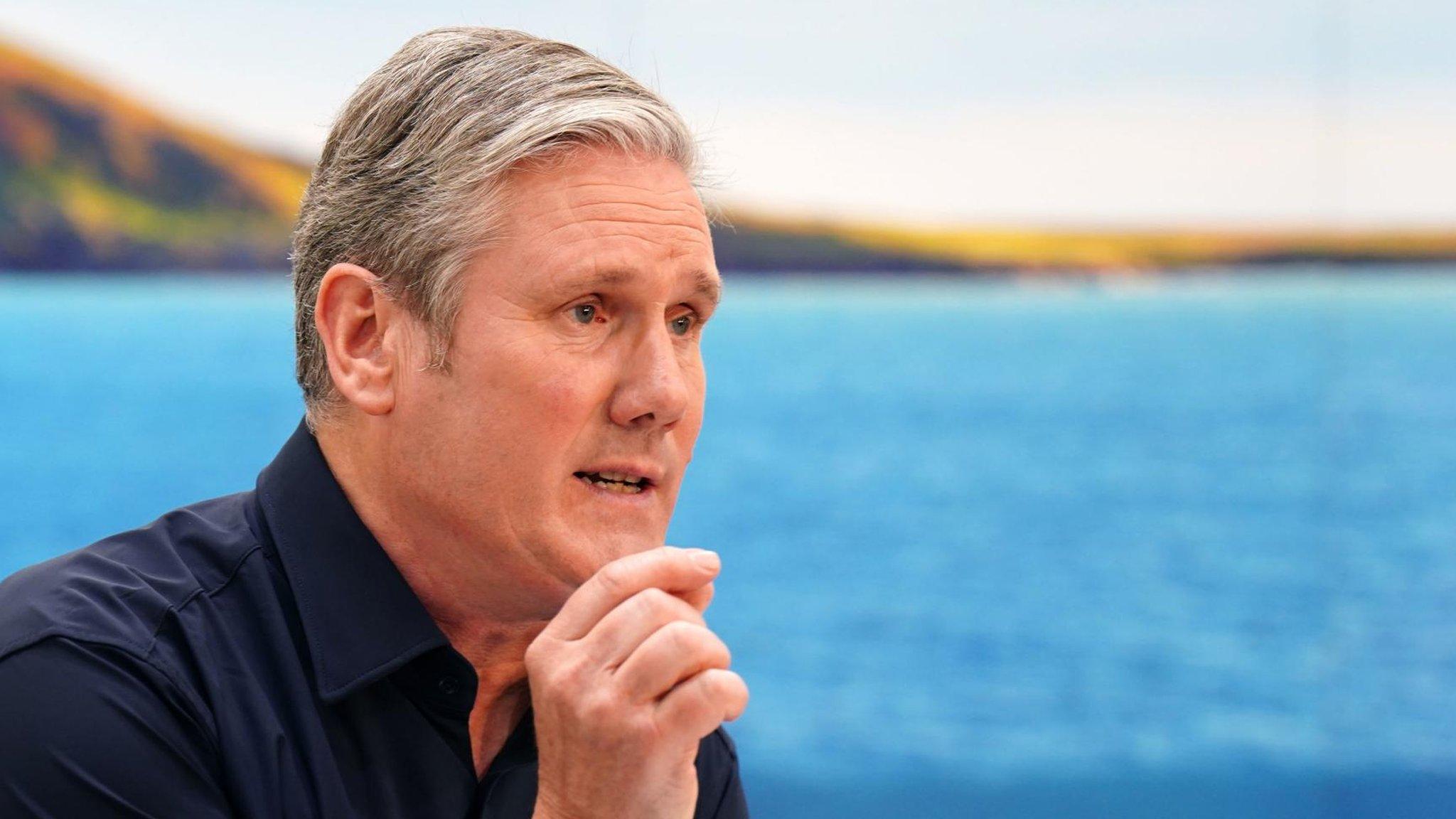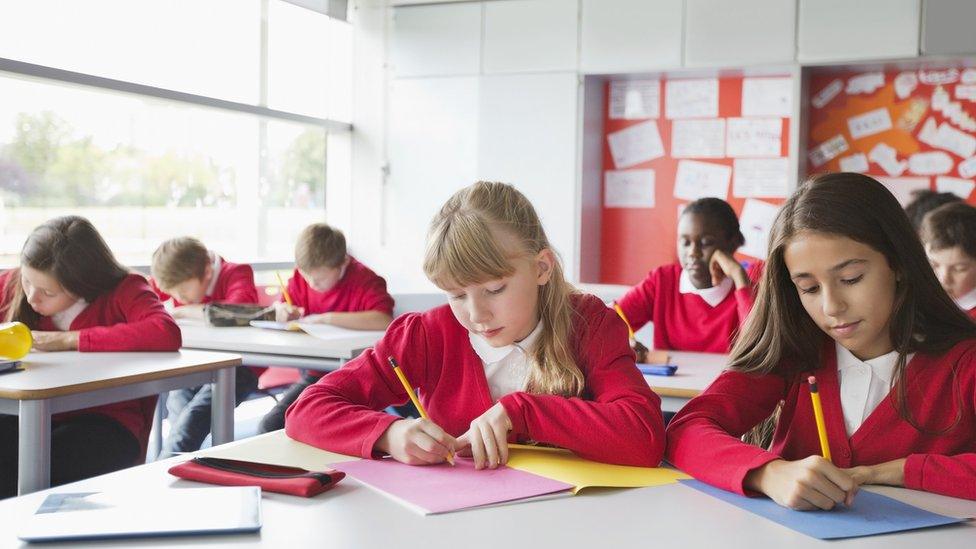Speaking skills key to break class barriers, says Keir Starmer
- Published
- comments
Sir Keir says people's circumstances should not hold them back and "you don't have to change who you are, just to get on".
Labour leader Sir Keir Starmer has pledged to improve children's speaking skills, as part of a drive to break down class barriers to opportunity.
He also promised to give vocational and academic learning equal status, in a speech on education policy.
Touching on his own background, he said people from working class backgrounds were now less able to advance in life.
But his speech was interrupted by protesters, unveiling a banner saying: "No more u-turns, Green new deal."
The two young people who were protesting were standing right behind Sir Keir on the podium. Later, climate group Green New Deal Rising claimed responsibility for the disruption.
The Labour leader's speech unveiled details of the fifth and final "mission" the party is focused on ahead of the general election, expected next year.
The missions are expected to form the backbone of the party's election offer to voters, and shape its priorities in government if it wins power.
In his speech, Sir Keir promised a goal of half a million more children reaching early learning targets by 2030, as well as a review of the curriculum from the beginning of primary school through to the end of compulsory education.
Creative arts
He said a Labour government would "tear down" obstacles to opportunity, which he dubbed the "class ceiling".
"There's something more pernicious here, a pervasive idea, a barrier in our collective mind that narrows our ambitions for working class children and says - sometimes with subtlety, sometimes to your face - this isn't for you," he said.
He said the previous Labour government didn't "eradicate the snobbery that looks down on vocational education, didn't drain the well of disrespect that this creates, and that cost us."
He said more children should study sport or a creative arts subject until they are 16, as well as a focus on digital skills.
Climate change protesters interrupt Sir Keir Starmer speech calling for a "green new deal right now".
"For our children to succeed, they need a grounding in both, need skills and knowledge, practical problem-solving and academic rigour," he said.
"But now - as the future rushes towards us, we also need a greater emphasis on creativity, on resilience, on emotional intelligence and the ability to adapt."
Labour has already committed to recruiting 6,500 extra teachers in shortage subjects such as maths, paid for by removing tax breaks for private schools, which the party calculates will raise over £1bn a year.
It also wants to use that additional funding to pay teachers a £2,400 retention bonus after they have completed their first two years of training.
But the Labour leader declined to commit to giving teachers in England a 6.5% pay rise this year - the figure reportedly set to be recommended by the pay review body for the profession, amid the economic backdrop.
He told the BBC's political editor Chris Mason he would be negotiating "every day of the week" to resolve the strike.
Speaking to BBC Radio 4's Today programme he also did not committed to delivering universal free school meals in primary schools, something the Labour-run Welsh government has committed to delivering by next year.
In his interview, he admitted financial constraints would be a "big factor" for him to consider, amid a "broken" economy.
'Lack of respect'
Sir Keir's speech unveils the detail on Labour's education pledge, marking the last of his "missions" as the party eyes the next general election. The Labour leader has said his missions would form "the backbone of the Labour manifesto and the pillars of the next Labour government".
The other commitments include securing the "highest sustained growth" in the G7 group of nations, by the end of Labour's first term, removing fossil fuels from all of Britain's electricity generation by 2030, improving the NHS and reforming the justice system.
The National Association of Headteachers (NAHT) union welcomed Labour's proposals but warned they must be matched by "significant additional investment", not only in education but in community support and social care.
"There is no doubt that schools can play a vital role in helping children to thrive no matter what their background, but they need the appropriate resources to do so," Paul Whiteman, NAHT general secretary, said.
Education Secretary Gillian Keegan dismissed Sir Keir's speech as "a load of old nonsense".
She accused Labour of offering "gimmicks that don't help children or working class children", saying the government was focused on high quality education and apprenticeships to help social mobility.
She dismissed Sir Keir's plans on improving speaking skills, insisting that this already happened throughout the curriculum, adding: "We have revolutionised our education system and skills system."
Asked about the Green New Deal Rising protest during the speech, Sir Keir denied backtracking on Labour's £28bn green prosperity plan, saying "We haven't backed down, we've doubled down."
And he condemned Just Stop Oil's protests as "hugely arrogant", saying: "When I put what they're doing against what we set out in our mission about clean energy, about net zero, you can see the difference between protest and power.
"Glueing yourself, interrupting, interfering with other people's lives in this arrogant way, compared with the actual change we can bring about, which is with a Labour government absolutely committed to clean power by 2030."
Related topics
- Published23 February 2023

- Published19 June 2023

- Published2 July 2023
